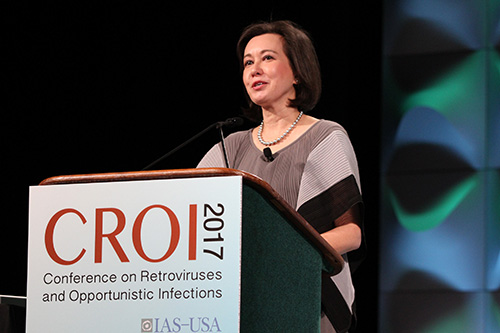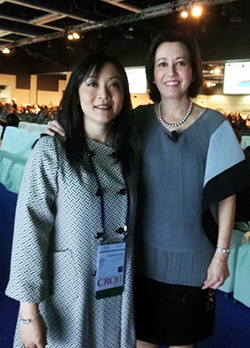“I might be the first person to be cured. It’s also a benefit to others,” said a Thai volunteer in a study of early HIV treatment called RV411. “However, it’s okay too if I cannot be cured.”
This patient’s voice was one of several brought to life by Dr. Jintanat Ananworanich of the U.S. Military HIV Research Program (MHRP), in her inspiring presentation on HIV cure research at the Conference on Retroviruses and Opportunistic Infections (CROI) this past February in Seattle. During the event’s plenary session, she made a compelling case for the urgency of finding a cure for HIV and laid out a coherent plan for how research should best proceed.

Dr. Jintanat Ananworanich presents "The Emerging Potential for HIV Cure for Infants, Children, and Adults" at CROI, February 2017 in Seattle.
Photo credit: Robb Cohen Photography & Video
“It is unlikely that any single agent will produce long-lasting HIV remission,” emphasized Dr. Ananworanich. “Over the next five years, we need to investigate combination therapies including early and better ART, latency reversing agents, broadly neutralizing antibodies, vaccines, immune checkpoint blockers, anti-inflammatory agents, engineered T cells, and gene editing therapies, among other methods, and the regulatory process for testing different approaches needs to be streamlined to speed up the research process,” she said. Dr. Ananworanich and Dr. Francoise Barré-Sinoussi of the Institut Pasteur outlined such an approach in an opinion piece published in The Lancet HIV.
The RV411 study is providing evidence that supports her opinion.
 Drs. Annette Sohn and Jintanat Ananworanich at CROI 2017RV411 is an offshoot of a larger study, RV254/SEARCH 10, an acute HIV infection study Dr. Ananworanich is leading through SEARCH (the South East Asia Research Collaboration on HIV). Participants in RV254 so far include more than 450 volunteers from Bangkok who were diagnosed within a few days or weeks of infection, during acute HIV, and immediately placed on antiretroviral therapy (ART). This early treatment resulted in immune restoration and a very small or undetectable reservoir of HIV. Researchers hope the study will shed light on how the immune system responds during the critical moments of early infection and identify strategies for future cure research.
Drs. Annette Sohn and Jintanat Ananworanich at CROI 2017RV411 is an offshoot of a larger study, RV254/SEARCH 10, an acute HIV infection study Dr. Ananworanich is leading through SEARCH (the South East Asia Research Collaboration on HIV). Participants in RV254 so far include more than 450 volunteers from Bangkok who were diagnosed within a few days or weeks of infection, during acute HIV, and immediately placed on antiretroviral therapy (ART). This early treatment resulted in immune restoration and a very small or undetectable reservoir of HIV. Researchers hope the study will shed light on how the immune system responds during the critical moments of early infection and identify strategies for future cure research.
After maintaining undetectable viral loads for two to five years, RV411 volunteers had their treatment interrupted. In all cases virus levels rebounded after an average of about a month, showing that early ART alone is not enough to induce HIV remission.
Dr. Ananworanich also emphasized that parallel social, behavioral, and ethics research needs to be conducted alongside clinical trials, so researchers can better understand how to work with and effectively communicate with trial participants.
“HIV cure research is a multidisciplinary effort that needs input from everyone: the community, ethicists, clinicians, social scientists, basic scientists, industry, and many others,” she said.
TREAT Asia Director Dr. Annette Sohn agrees, and added, “That this cutting-edge HIV cure research is being conducted in Thailand shows that this work can be accomplished in resource-limited settings.”
SEARCH Thailand is a joint research effort between MHRP and the Thai Red Cross AIDS Research Center. RV254 is partially funded by the National Institutes of Health and the U.S. Army.